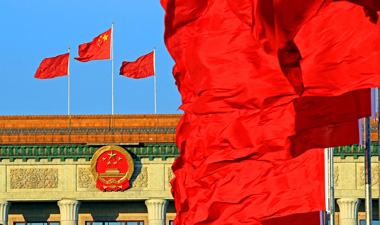A waiting world
- By Mei Xinyu
 0 Comment(s)
0 Comment(s) Print
Print E-mail Beijing Review, November 20, 2013
E-mail Beijing Review, November 20, 2013

The Third Plenary Session of the 18th Communist Party of China (CPC) Central Committee, as expected, attracted much domestic and global attention upon its conclusion on November 12. On the release of the official communiqué, one of the major questions being asked by media and analysts is what the session means to the world economy.
A year after the 18th CPC National Congress, China's top leadership has upheld the principle of making steady progress and solving problems while seeking development. As the communiqué reports, "China must build on the reality that it remains in the primary stage of socialism and will long remain so while pursuing comprehensive, deeper reform. China must stick to the strategic judgment that development is still the key to solving all problems in China."
In today's world, where the future of the global economy is uncertain and emerging economies are facing increasing risks, confirmation that the world's second largest economy is maintaining the same path is good news that ensures stable growth for the global economy.
The session's outcome demonstrates that China's core leadership is committed to and capable of executing reform and has the ability to overcome obstructions to push forward reforms that conform to the long-term interests of the state and the people. The communiqué says the leadership is to play the leading role in economic reform and promote the sustainable and sound development of the economy and society. It also mentions the establishment of a central leading team, which will be in charge of designing, coordinating and supervising the implementation of reform.
Open economy
Good news for foreign investors is that the plenary session committed again to supporting development of an open economy. According to the communiqué, to adapt to the new situation of globalization, China must advance opening up; better combine "bringing in" and "going out" of investment; and efficiently allocate resources and deepen market integration.
The communiqué reported that China is to relax investment restrictions and accelerate construction of free trade zones, with opening up to be expanded in inland and border areas.
Since China is the world's largest exporter, second largest importer and a fast-growing foreign direct investor, its attitude toward an open economy decides, to a great extent, the openness of the world economy. While many countries are retrogressing to trade protectionism, the plenary session's commitment to developing an open economy and expanding opening up will be powerful source of support to the global free trade system.
Expanding the opening up of inland and border areas is important for China to promote balanced development between regions. China's eastern region has already been developed, with levels of economic prosperity and people's living standards reaching those in moderately developed countries. Therefore, inland areas deserve more attention from foreign investors. In fact, during the past decade, China's central, western and northeastern regions have recorded higher growth rates than the eastern region in fixed-asset investment, GDP, industrial output and foreign trade.
In China, foreign investors can have a longer industrial life cycle, because China has a vast territory and regional development is imbalanced. Such a long life cycle is unlikely in most small and medium-sized countries. Regional development policies and guidance of industrial transfers by the Chinese Government will expand on this advantage in an orderly fashion.
Also of good news to foreign investors is that the plenary session pledged to accelerate the transformation of government functions and reduce direct intervention in the micro-economy.
According to the communiqué, China must accelerate the establishment of a modern market system under which businesses are allowed to operate independently and compete fairly, consumers are free to choose and spend, and merchandise and factors of production can be traded freely and equally. The CPC has pledged to clear barriers in the market and improve the efficiency and fairness in the allocation of resources. It will also create fair, open and transparent market rules and improve the market pricing mechanism. Land in cities and the countryside, which can be used for construction, will be pooled in one market, the financial market system will be improved, and reform of the science and technology system will be deepened. These aspects mean that China's soft environment for investment will be further improved, and its public services will remain efficient and continue to be improved.






Go to Forum >>0 Comment(s)